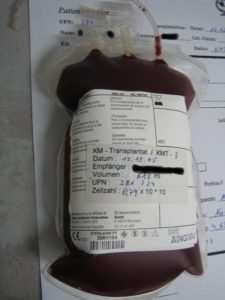
Recently Diagnosed or Relapsed? Stop Looking For a Miracle Cure, and Use Evidence-Based Therapies To Enhance Your Treatment and Prolong Your Remission
Multiple Myeloma an incurable disease, but I have spent the last 25 years in remission using a blend of conventional oncology and evidence-based nutrition, supplementation, and lifestyle therapies from peer-reviewed studies that your oncologist probably hasn't told you about.
Click the orange button to the right to learn more about what you can start doing today.
- You are here:
- Home »
- Blog »
- Multiple Myeloma »
- Multiple Myeloma Therapy- Low-dose Maintenance vs. Stem Cell Transplant?
Multiple Myeloma Therapy- Low-dose Maintenance vs. Stem Cell Transplant?
“However, the rapidity of achievement of this response (VGPR or better), whether early or late during the course of the treatment, does not impact survival…”
Hi David- I am currently undergoing multiple myeloma therapy. My history is below. My oncologist is pushing an autologous stem cell transplant yet I seem to be doing fine with low-dose maintenance therapy. What to you think?
1. Diagnosed MM in : November 2017.
2. Treatment : Started in Dec2017.
The suggested treatment was 6 cycles of Chemotherapy and there after Bone Marrow Transplant (Autologous BMT). Each cycle of 28 days of chemotherapy includes Lenalidomide 25mg for 21 days and 7 days off (28 days), Bortezomib 2mg & Dexamethasone 40mg ,both, once in a week for 4 weeks (28 days)., and Zoldronic acid 4mg, once in a month. With the treatment of Steroid, Now I am diabetic.
3. After 6 Chemo cycles, the report was suggestive of CR.
It was planned to undergo Autologous Bone Marrow Transplantation (PBSCT), at RCC Thiruvavanthapuram. But delayed due to excess rush at RCC.
Hence, Bortezomib 2mg & Dexamethasone 40mg (both, once in a week) and Zoldronic acid 4mg, (once in a month) are continued …..
4. In Dec 2018, the report was suggestive of VGPR.
5. In April 2019, I was admitted for HDCT and PBSCT. GCSF was given for 5 days. Two sessions of aphaeresis were also done with stem cell yield of 3.8×106/ kg. But bleeding was started from catheter sites. The HDCT and PBSCT were abandoned. Further investigation was suggestive of Factor-VIII and vWF deficiency (mild disorder). I have never faced such bleeding disorder till then. No such cases were reported in my family also.
6. After that, Bortezomib 2mg & Dexamethasone 40mg (both, once in a week) and Zoldronic acid 4mg, (once in a month) are continuing.
7. The latest report as on 14/9/2019 is also suggestive of VGPR.
8. Factor-VIII and vWF again tested on 11/10/2019. It shows that Factor-VIII is now changed into moderate disorder.
Is it advisable to take red wine? What quantity is beneficial. I was taking one or two peg of Smrinnoff once in a month or so. Is it advisable to take? Manny
Hi Manny-
- MM Survivor
- MM Coach
- Director PeopleBeatingCancer
Recommended Reading:
- Myeloma Chemotherapy- Modify Induction, Limit maintenance, live longer
- Multiple Myeloma Therapy- Role of Stem Cell Transplant (ASCT)
- Multiple Myeloma Side Effects- Stem Cell Transplant & Heart Failure-
Outcomes with early response to first-line treatment in patients with newly diagnosed multiple myeloma
“Rapid or late achievement of VGPR or better with first-line treatment does not affect long-term survival outcomes…
Patients who achieved VGPR or better as overall best response had significantly better PFS…
In conclusion, our data support that achievement of a deep response after first-line treatment is prognostic for improved long-term outcomes. However, the rapidity of achievement of this response, whether early or late during the course of the treatment, does not impact survival…”


